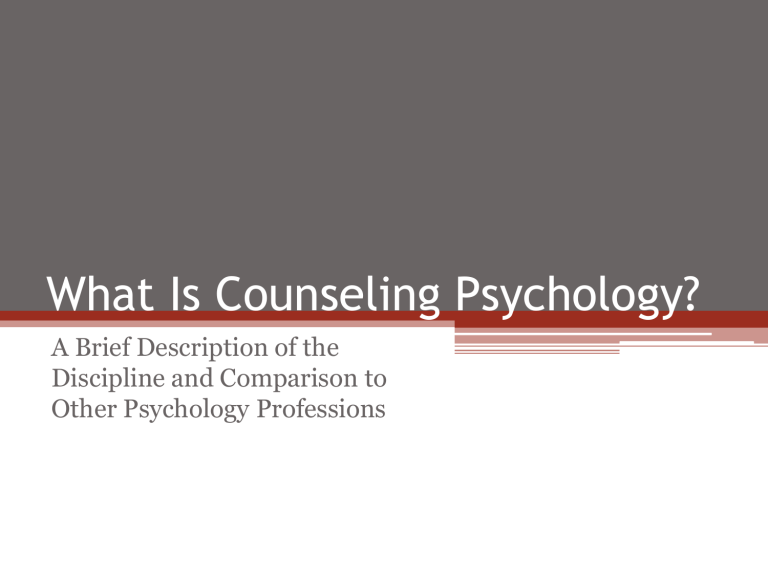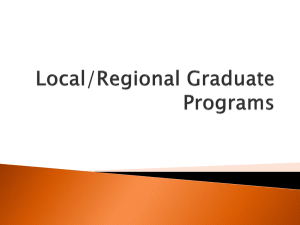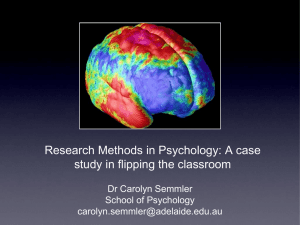Counseling Psychology - American Psychological Association

What Is Counseling Psychology?
A Brief Description of the
Discipline and Comparison to
Other Psychology Professions
In This Presentation, You Will …
• Learn more about counseling psychology
• Develop an understanding of the differences and similarities between counseling psychology and other psychology disciplines
• Gain information to help you make informed decisions regarding your career path
Counseling Psychology Is One Specialty in Professional Psychology
• According to the website of the Society of
Counseling Psychology, “Counseling psychology as a psychological specialty facilitates personal and interpersonal functioning across the life span with a focus on emotional, social, vocational, educational, health-related, developmental, and organizational concerns” ( www.div17.org
)
• Counseling psychology is a broad and diverse discipline within mental health care
▫ Can lead to many different careers
Psychology Is Very Broad
• There are many different subfields of psychology:
▫ Counseling Psychology,
▫ Clinical Psychology,
▫ Cognitive Psychology,
▫ Developmental Psychology,
▫ Experimental Psychology
▫ Forensic Psychology,
▫ Health Psychology,
▫ Industrial/Organizational
Psychology,
▫ Neuropsychology,
▫ School Psychology,
▫ Social Psychology,
▫ Sport Psychology,
▫ the list goes on and on …
• Additionally, the type of degree earned can differ:
▫ Ph.D., Ed.D., Psy.D., M.S., M.A.
Scientist-Practitioner Model
• Counseling psychologists are usually trained to be scientists as well as professional practitioners
• Learn how to understand and conduct scientific research
• Learn how to conduct therapy
• Doctoral level degree is required to be a counseling psychologist in the United States
(e.g., Ph.D., Psy.D., Ed.D. )
Source: Gelso & Fretz, 2001
*Note. Models of training may soon be eliminated in favor of competencies.
Becoming a Counseling Psychologist
Typical Requirements to
Become a Counseling
Psychologist
Typical Components of
Doctoral Programs in
Counseling Psychology
• Graduate School
▫ Full-time study in a doctoral program (Post Bachelor’s
Degree or Post Master’s
Degree)
• Post-doctoral training
▫ Not required in all states
• Licensure
▫ Must pass nationallyadministered examination
▫ Must meet state requirements, including state policies for psychologists
• Course work
• Practica
• Comprehensive exams
(i.e., doctoral qualifying exams)
• Internship
• Dissertation
What Do Counseling Psychologists Do?
• The majority of counseling psychologists have described their primary role as either a clinical practitioner (working with clients) or an academician (faculty member at a college or university;
Watkins et al., 1986).
• However, many counseling psychologists participate in a wide range of activities
( www.div17.org
):
▫ Psychotherapeutic and
Counseling Practice
▫ Teaching
▫ Research
▫ Career Development
▫ Testing, Assessment, and
Evaluation
▫ Supervision
▫ Consultation
▫ Administrative Activities
▫ Facilitate social justice, diversity, and multicultural agendas and initiatives
Where Do Counseling Psychologists
Typically Work?
Setting
College or University (Faculty Member)
Independent Practice
College or University Counseling Center
Hospital
Clinic
Human Services (nursing home, rehab facility, etc.)
Government (military, government, criminal justice system)
School/Education Setting
Medical School
Business and Industry
Other
7.4
4.4
4.2
2.1
2.1
%
35.2
20.1
17.2
1.7
0.9
4.5
Source: Gelso & Fretz, 2001 (Based on the 1995 APA Directory Survey)
Counseling Psychology Trends
• May be likely to work with clients who are closer to the “normal” range of functioning
▫ This is not always the case, as many counseling psychologists work with clients with more “severe” psychopathology
• Focus on strengths instead of a focus on psychopathology only
▫ May focus on taking clients past normal functioning to an “optimal” level of functioning
• Focus on early intervention and prevention efforts, setting counseling psychology apart from many other disciplines
Sources: Gelso & Fretz, 2001, & Society of Counseling Psychology Website
Counseling Psychology Trends
• Focus on career-related issues
▫ Vocational choice and development are often studied
▫ Often work with clients who have problems in the career realm
• Place an emphasis on multicultural research, practice, and training
▫ The role of culture in therapy and in society is explored
• Place an emphasis on social justice issues
Sources: Gelso & Fretz, 2001, & Society of Counseling Psychology Website
Counseling Psychology vs.
Related Disciplines
Clinical Psychology
▫ There is much overlap between counseling and clinical psychology
▫ More emphasis on psychopathology in clinical psychology
Community Psychology
▫ Focuses on personenvironment interactions
▫ Moves beyond the individual and examines community settings
▫ Not likely to involve direct counseling / therapy
Source: Gelso & Fretz, 2001
Counseling Psychology vs.
Related Disciplines
• Psychiatry
Medical doctor
Prescribes medication
May conduct psychotherapy, but much less common
• School Psychology
Primarily work with children in schools
• Industrial/Organizational Psychology (I/O Psychology)
The study of behavior in work settings
• Psychiatric Social Work
Conduct counseling (Master’s or Doctoral level)
• Mental Health Counseling
Conduct counseling (Master’s or Doctoral level)
• Marriage and Family Therapy
Conduct counseling (Master’s or Doctoral level)
Source: Gelso & Fretz, 2001
In Conclusion
• Counseling psychology is a very broad degree that can lead to employment in many different settings.
• Although this PowerPoint may be a good starting point, you will probably need to learn more in order to determine if earning a degree in counseling psychology is the best fit for you.
For More Information On Counseling
Psychology
• Student Affiliates of Seventeen (SAS) Website:
▫ http://www.div17.org/SAS/index.html
• Division of Counseling Psychology website
▫ http://www.div17.org/
Look for resources under the “Student” subheading.
• List of APA Accredited Counseling Psychology
Programs:
▫ http://www.apa.org/ed/accreditation/programs/ac cred-counseling.aspx
References and Additional Resources:
• Fitzgerald, L. F., & Osipow, S. H. (1986). An occupational analysis of counseling psychology: How special is the specialty? American Psychologist, 41, 535-
544.
• Gelso, C., & Fretz, B. (2001). Counseling psychology (2 nd ed.). Belmont, CA:
Wadsworth.
• Norcross, J. C., Sayette, M. A., Mayne, T. J., Karg, R. S., & Turkson, M. A. (1998).
Selecting a doctoral program in professional psychology: Some comparisons among PhD counseling, PhD clinical, and PsyD clinical psychology programs.
Professional Psychology: Research and Practice, 29, 609-614.
• Norcross, J. C. (2000). Clinical psychology vs. counseling psychology: What’s the diff? Eye on Psi Chi, 5(1), 20-22.
• Society of Counseling Psychology (2010). Society of counseling psychology, division 17. Retrieved from http://www.div17.org/
• Watkins, C. E. (1983). Counseling psychology versus clinical psychology: Further explorations on a theme or once more around the "identity“ maypole with gusto. The Counseling Psychologist, 11, 76-92.
• Watkins, C. E., Lopez, F. G., Campbell, V. L., & Himmell, C. D. (1986).
Counseling psychology and clinical psychology: Some preliminary comparative data. American Psychologist, 41, 581- 582.
• Watkins, C. E., Lopez, F. G., Campbell, V. L., & Himmel, C. D. (1986).
Contemporary counseling psychology: Results of a national survey.
Journal of Counseling Psychology, 33, 301-309.







